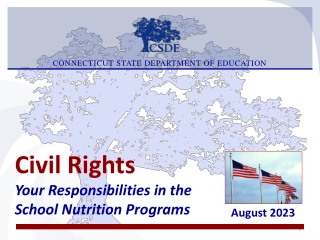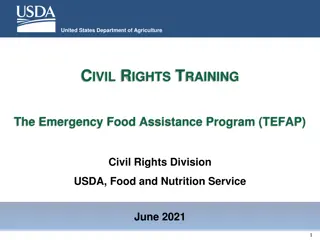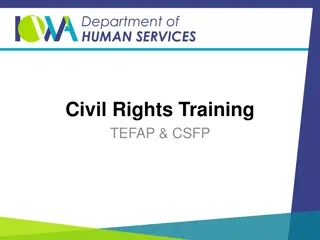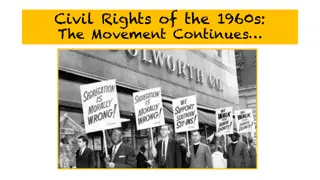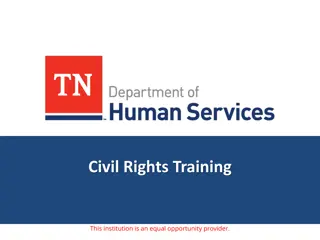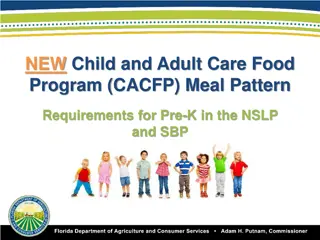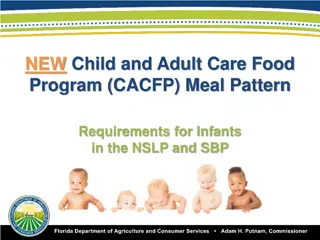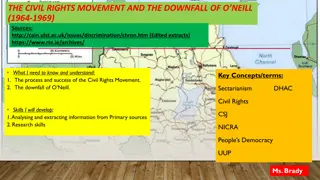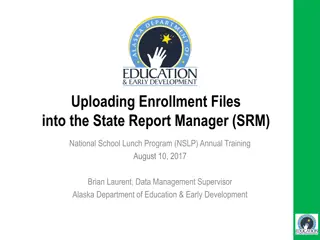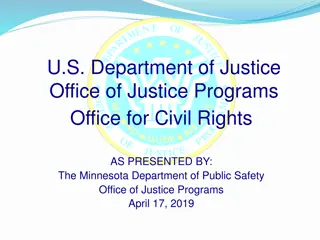
Comprehensive Civil Rights Compliance and Protection Against Discrimination
Ensure fair and equitable treatment for all individuals in employment and program participation by providing leadership in civil rights compliance. Learn about legal authorities, discrimination complaints, and the importance of upholding personal liberties. Understand the distinctions between civil rights and equal employment opportunity, and combat stereotypes, prejudice, and discrimination. Stay informed about federal requirements for programs receiving financial assistance to protect against race, color, national origin, disability, sex, and age discrimination.
Download Presentation

Please find below an Image/Link to download the presentation.
The content on the website is provided AS IS for your information and personal use only. It may not be sold, licensed, or shared on other websites without obtaining consent from the author. If you encounter any issues during the download, it is possible that the publisher has removed the file from their server.
You are allowed to download the files provided on this website for personal or commercial use, subject to the condition that they are used lawfully. All files are the property of their respective owners.
The content on the website is provided AS IS for your information and personal use only. It may not be sold, licensed, or shared on other websites without obtaining consent from the author.
E N D
Presentation Transcript
November 16, 2015 November 16, 2015 1
To provide leadership for comprehensive protection against discrimination in employment practices and delivery of programs to the public. Our goal is to ensure that applicants and individuals who are eligible to participate in our programs are treated fairly and equitably, with dignity and respect. 2
Civil Rights coverage and legal authorities Areas of compliance Assurances Public notification Complaints of discrimination Civil Rights training Racial and ethnic data collection Limited English Proficiency (LEP) Disability compliance Compliance reviews and resolution of noncompliance Questions/open discussion 3
The rights of personal liberty guaranteed to U.S. citizens by the 13th and 14th Amendments of the Constitution and Acts of Congress Terms civil rights and equal employment opportunity (EEO) are not not interchangeable 4
Stereotyping Preconceived beliefs or over-simplified generalizations about a particular group Prejudice A set of rigid and unfavorable attitudes toward a particular group that is formed without considering facts Discrimination The practice of treating people differently because of how we have grouped them in our minds according to our prejudices 5
Programs and activities receiving federal financial assistance must abide by Civil Rights requirements Title VI of the Civil Rights Act of 1964 Title VI of the Civil Rights Act of 1964 Race, color, national origin Civil Rights Restoration Act of 1987 Civil Rights Restoration Act of 1987 Clarifies the scope of the Civil Rights Act of 1964 Section 504 of the Rehabilitation Act of 1973 Section 504 of the Rehabilitation Act of 1973 Disability Americans with Disabilities Act (ADA) of 1990/Americans with Disabilities Act Amendments Act (ADAAA) of 2008 Americans with Disabilities Act (ADA) of 1990/Americans with Disabilities Act Amendments Act (ADAAA) of 2008 Disability Title IX of the Education Amendments of 1972 Title IX of the Education Amendments of 1972 Sex Age Discrimination Act of 1975 Age Discrimination Act of 1975 Age 6
Richard B. Russell National School Lunch Act of 1946 Signed by President Harry Truman and established the NSLP Child Nutrition Act of 1966 Signed by President Lyndon B. Johnson; SMP incorporated into the Act; SBP was established 7 CFR Parts 15, 15a, 15b Gives USDA agencies authority to develop Civil Rights requirements 7 CFR Part 16, Equal Opportunity for Religious Organizations Gives equal footing to religiously affiliated organizations 7 CFR Part 210 NSLP regulations 7
7 CFR Part 215 SMP regulations 7 CFR Part 220 SBP regulations 7 CFR Part 245 NSLP/SMP/SBP determining eligibility for free and reduced price meals and free milk in schools 28 CFR Part 35 Covers nondiscrimination on the basis of disability in State/local government services 28 CFR Part 42 Covers nondiscrimination in Federally assisted programs 8
Executive Order 13166 LEP USDA Departmental Regulation 4330-2 Prohibits discrimination in programs and activities funded in whole or in part by the USDA FNS Eligibility Manual for School Meals Provides additional guidance on determining and verifying eligibility FNS Instruction 113-1 and Appendix B (NSLP/SMB/SBP) Provides information on Civil Rights compliance and enforcement 9
Different treatment which makes a distinction of one person or a group of persons from others, either intentionally, by neglect, or by the actions or lack of actions based on a protected class Protected classes for NSLP/SMP/SBP Race Color National origin Age Sex Disability 10
To qualify for Federal financial assistance, an application must be accompanied by a written assurance that the entity to receive financial assistance will be operated in compliance with all nondiscrimination laws, regulations, instructions, policies, and guidelines. A Civil Rights assurance must be incorporated in all agreements between State and local agencies. 11
Subrecipient agreements must also include a Civil Rights assurance of nondiscrimination. Many SFAs contract with Food Service Management Companies (FSMC) to provide food service to students. SFAs are be responsible for ensuring that their FSMCs are in compliance with CR requirements. These assurances are binding on the program applicant and its successors, transferees, and assignees, as long as they receive assistance or retain possession of any assistance from USDA. 12
All FNS assistance programs (i.e. NSLP/SMP/SBP) must include a public notification system. Elements of public notification Program availability Complaint information Nondiscrimination statement 13
Program Availability Inform applicants, participants, and potentially eligible persons of their program rights and responsibilities and the steps necessary for participation Complaint Information Must advise applicants and participants at the service delivery point of their right to file a complaint, how to file a complaint, and the complaint procedures Nondiscrimination Statement All information materials and sources, including websites, must contain a nondiscrimination statement. (The statement is not required to be included on every page of the program Web site. At a minimum the nondiscrimination statement or a link to it must be included on the home page of the program information.) Program Availability Complaint Information Nondiscrimination Statement 14
State agencies and their subrecipients must: Must prominently display the And Justice for All poster at service delivery points Inform applicants or participants of programs or changes in programs Provide information in alternative formats and languages as necessary Convey message of equal opportunity in all photographic or pictorial program information 15
In accordance with Federal civil rights law and U.S. Department of Agriculture (USDA) civil rights regulations and policies, the USDA, its Agencies, offices, and employees, and institutions participating in or administering USDA programs are prohibited from discriminating based on race, color, national origin, sex, disability, age, or reprisal or retaliation for prior civil rights activity in any program or activity conducted or funded by USDA. Persons with disabilities who require alternative means of communication for program information (e.g. Braille, large print, audiotape, American Sign Language, etc.), should contact the Agency (State or local) where they applied for benefits. Individuals who are deaf, hard of hearing or have speech disabilities may contact USDA through the Federal Relay Service at (800) 877-8339. Additionally, program information may be made available in languages other than English. To file a program complaint of discrimination, complete the USDA Program Discrimination Complaint Form, (AD-3027) found online at: http://www.ascr.usda.gov/complaint_filing_cust.html, and at any USDA office, or write a letter addressed to USDA and provide in the letter all of the information requested in the form. To request a copy of the complaint form, call (866) 632-9992. Submit your completed form or letter to USDA by: (1) mail: U.S. Department of Agriculture Office of the Assistant Secretary for Civil Rights 1400 Independence Avenue, SW Washington, D.C. 20250-9410; (2) fax: (202) 690-7442; or (3) email: program.intake@usda.gov. This institution is an equal opportunity provider. 16
Translations in Spanish and other languages are forthcoming 17
At a minimum, the Nondiscrimination Statement must be on Application Form(s) Notification of Eligibility or Ineligibility Notice of Adverse Action Form Program (Home) Web Page Public Information, including program literature 18
All sites must display the poster in a prominent location for all to view. *In classrooms if students don t visit the cafeteria AD-475A Required version for NSLP/SMP/SBP Poster icon on this slide will change to reflect new nondiscrimination statement and graphic 19
Applicants or participants allege different treatment based on protected class(es) Race Color National origin Age Sex Disability 20
Complaint procedures Complaints processed at the State level: Complaint procedures Complaints processed at the State level: System must be approved by FNS and operated in accordance with FNS Instruction 113-1 Complaints not processed by the State level Complaints not processed by the State level Must be forwarded to FNS Civil Rights Division within 5 business days of receipt *NJ Department of Agriculture follows this procedure *NJ Department of Agriculture follows this procedure Complaints based on age (or a combination of age and other bases) Complaints based on age (or a combination of age and other bases) Must all be forwarded to FNS Civil Rights Division within 5 business days of receipt regardless of complaint procedure utilized above Complaint log Complaint log Civil Rights complaints must be maintained in a log separate from other program complaints 21
Additional information Applicants and participants must file within 180 days of the alleged action Confidentiality extremely important USDA complaint form English version: http://www.ocio.usda.gov/sites/default/files/docs/2 012/Complain_combined_6_8_12.pdf Spanish version: http://www.ocio.usda.gov/sites/default/files/docs/2 012/Spanish_Form_508_Compliant_6_8_12_0.pdf Additional information 22
Training is required so that individuals involved in all levels of administration of programs that receive Federal financial assistance understand Federal laws, regulations, instructions, policies and other guidance. 23
State agencies are responsible for training local agencies/subrecipients. Local agencies are responsible for training their staff and subrecipients on an annual basis Includes frontline staff and those who supervise frontline staff annual basis. New employees must receive Civil Rights training before participating in Program activities. Volunteers (if any) must also receive training appropriate for their roles and responsibilities. 24
All staff should receive training on all aspects of Civil Rights compliance, including: Assurances Public notification Complaints of discrimination Civil Rights training Racial and ethnic data collection Limited English Proficiency (LEP) Disability compliance Compliance reviews and resolution of noncompliance Conflict Resolution Customer Service 25
Data collection is mandatory Recipients of federal financial assistance must maintain a system to collect racial and ethnic data in accordance with FNS policy Data is used to: Determine how effectively FNS programs are reaching potentially eligible people Identify areas where additional outreach is needed Assist in the selection of locations for compliance reviews Complete reports as required Data must be maintained for 3 years Must be submitted to FNS as requested 26
Data must be collected using a two-part question 1. Ethnicity Hispanic or Latino Not Hispanic or Latino 1. Ethnicity 2. Race American Indian or Alaskan Native Asian Black or African American Native Hawaiian or Other Pacific Islander White 2. Race (may select more than one) (may select more than one) 27
How to collect racial and ethnic data if: An applicant chooses not to voluntarily provide the information (in person)? The application process uses an online application (and the applicant does not voluntarily provide the information)? Children are not to be surveyed. Questions must be posed to parents/legal guardians. 28
School Food Authorities should compare their participant data with their total enrollment. If disparities or incidents of underrepresentation exist, it will be necessary to investigate the causes. If necessary, take action to ensure equal opportunity to participate in the program(s). 29
Who are persons with LEP? Individuals who do not speak English as their primary language and who have a limited ability to read, speak, write, or understand English because of their national origin Recipients of Federal financial assistance have a responsibility to take reasonable steps to ensure meaningful access to their programs and activities by persons with LEP. Failure to provide meaningful access to persons with LEP could be discrimination on the basis of national origin. 30
Factors included in assuring meaningful access The number or proportion of LEP people eligible to be served or likely to be encountered by the program The frequency with which LEP individuals come in contact with the program The nature and importance of the program, activity, or service provided by the program to people s lives The resources available to the recipient and costs 31
State agencies must conduct assessments to determine language profile for their State, taking into account regional differences and updating as appropriate. Translation of vital documents is required. Oral translations and interpretation services are also required. Staff training regarding how to provide LEP populations with meaningful access is paramount (frontline staff). 32
Language services Applicants and participants cannot be asked to bring their own interpreters Children should not not be used as interpreters Examples of language services Bilingual staff Telephone interpreter lines Oral interpretation services Written language services Community organizations and volunteers 33
Population data sources US Census Data http://www.census.gov/2010census/data/ American Community Survey http://www.census.gov/acs/ Migration Policy Institute s National Center on Immigrant Integration Policy http://www.migrationpolicy.org/ 34
What is the definition of disability? A person who has a physical or mental impairment which substantially limits one or more major life activities, has a record of such an impairment, or is regarded as having such an impairment. Major life activity means functions such as caring for one s self, performing manual tasks, walking, seeing, hearing, speaking, breathing, learning and working. reproductive functions. (ADA Amendments Act of 2008) functions of the immune system, normal cell growth, digestive, bowel, bladder, neurological, brain, respiratory, circulatory, cardiovascular, endocrine, and 35
State and local offices must provide reasonable accommodations in policies and practices to applicants and participants with disabilities when necessary. Reasonable accommodations Must be funded through State/local offices, not by applicants and participants Require good communication between all parties involved Provide the same level of service to applicants and participants in an alternative way 36
Accessibility of State and local agency websites, and online application systems to persons with visual impairments and other disabilities. Physical Program access to persons in wheelchairs and with mobility disabilities. Accessibility through Braille, large print and audio tape and other alternative formats. Accessibility to American Sign Language (ASL) and interpreters. 37
State agencies must have a 504/ADA Coordinator responsible for ensuring compliance and investigating complaints. State agencies must have published grievance procedures and due process standards for fair and prompt resolution of 504/ADA complaints. 38
Examine the activities of State agencies, local agencies, and subrecipients to determine Civil Rights compliance FNS Civil Rights and Program staff review State agencies. FNS staff and State agencies review local agencies and subrecipients. Significant findings must be provided in writing to the reviewed entity. 39
There are three types of compliance reviews Pre-award compliance reviews Routine (post-award) compliance reviews Special compliance reviews 40
State and local agencies must be in compliance with Civil Rights requirements prior to approval for Federal financial assistance. Usually conducted as desk reviews. Reports must be maintained in appropriate program files. 41
Routine/Post-Award Reviews FNS and State agencies must conduct routine compliance reviews as identified by FNS Instruction 113-1 and program-specific regulations and policies Assess all of the Civil Rights compliance areas Sample post-award review questions Do printed materials contain the nondiscrimination statement? Is the And Justice For All poster displayed appropriately? Are program informational materials available to all? Is data on race and ethnicity collected appropriately? How are applicants and participants advised of their right to file a Civil Rights complaint of discrimination? Are reasonable accommodations appropriately made for people with disabilities? 42
Conducted by USDAs Office of the Assistant Secretary for Civil Rights independently or in conjunction with FNS program or Civil Rights staff May be scheduled or unscheduled To follow-up on previous findings of noncompliance To investigate reports of noncompliance by other agencies, media, or grassroots organizations May be specific to an incident or policy History of statistical underrepresentation of particular group(s) Pattern of complaints of discrimination 43
A factual finding that any Civil Rights requirement, as provided by law, regulation, policy, instruction, or guidelines, is not being adhered to by a State agency, local agency or subrecipient agency Steps must be taken immediately to obtain voluntary compliance A finding s effective date is the date of notice to the reviewed entity 44
Questions? 45
Michele Director, Civil Rights USDA, Food and Nutrition Service Mid-Atlantic Region Mercer Corporate Park 300 Corporate Blvd. Robbinsville, NJ 08691 Telephone: (609) 259-5061 Email: michele.sazo@fns.usda.gov Michele Sazo Regional Sazo Regional Director, Civil Rights Covering Delaware, District of Columbia, Maryland, New Jersey, Pennsylvania, Puerto Rico, Virgin Islands, Virginia, West Virginia 46


